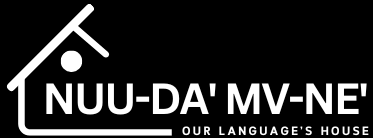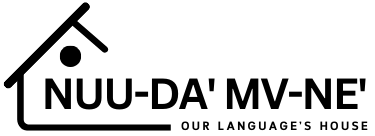What We Do
Nuu-wee-ya’, “our language,” or “our words,” is a term that describes the many dialects of southwest Oregon Dene.
Nuu-da’ Mv-ne’
We are guided by our peoples’ values:
Waa-tr’vslh-’a~ (the way it is kept)
Wvs-xe (being good natured or good hearted)
Ghvt-lu (laughter)
Da’-ye’ (family)
Shu’-’aa-xu (careful and intentional actions)
Lhee-wi (balance)
Lhes-ya (coming together)
We are doing our best to do all of this work in accordance with K’ii-daa-na’, our ancestors’ Indian laws for how to live in this world.
Our organization acts as a resource center for Nuu-wee-ya’ language and culture revitalization, and as a hub for grassroots language work. Language revitalization happens when a community begins working to revive the use of their heritage language. Revitalization of Nuu-wee-ya’ has been going on for nearly a century, and we are proud to continue the work of our families.
We are a Dv-ne run organization, and our board is made up of people from different dialect communities of Nuu-wee-ya’ who have dedicated large parts of their lives to revitalizing the language.
Our vision is to see Nuu-wee-ya’ spoken every day by Dv-ne / Dee-ni’ / Tv-de / Daa-da families.
To Realize our vision
we are working in several areas
Native-led Archiving
Our organization got its start by doing archival work on previously-inaccessible language materials from the Siletz Reservation and Tolowa country. These materials had been taken by ethnographers and linguists and used for academic purposes, but never made accessible to the community to support revitalization in a meaningful way. Our solution? Collaborate with the National Breath of Life Institute for Indigenous Languages, a Native-run revitalization center, to create a digital archive for materials to be hosted online! Today, we are continuing to expand ILDA with the eventual goal to host all publicly-shareable archival material of Nuu-wee-ya’ in a single location. ILDA is a foundation to support us as we create dictionaries, learning materials, and help to distribute archival materials to families.
Native-led Linguistic Analysis
Endangered language teachers face big barriers when creating materials. There are often parts of the language that folks understand, but not quite well enough to teach to others. Linguistics, the scientific study of language, can be a useful tool for Native people who are revitalizing their language. Linguistics allows Native language researchers to work with language speakers and existing archival materials to answer questions about the language, which helps to create accurate and high quality learning materials. At Nuu-da’ Mv-ne’, we use our own linguistic education and collaborate with others to carry out linguistic research. As we answer questions about Nuu-wee-ya’, we deepen our understanding of the language. All of this work is aimed directly at creating high quality and accessible materials for learners.
Developing Accessible Materials for Learners
Based on the archival documents we have access to, our knowledge as learners, support from community speakers, and the linguistic work we take part in, we develop materials to help learners. We are currently designing a companion software to the ILDA archive that will work as an online learner’s app, a lot like a print dictionary. This app has the ability to support all the dialects of Nuu-wee-ya’.
We are also exploring ways to take care of and distribute traditional stories in the community. This is a sensitive topic for community members, and we are committed to doing so in a way that honors and follows our peoples’ teachings.
Finally, we are working to create a library of language and cultural educational materials that can support tribal people as they do their own home-based or family-based learning. Find this under our Resources page!
Building Up the Speech Community
In all our work, our ultimate goal is to support Nuu-wee-ya’ learners as they speak more Nuu-wee-ya’ in their daily lives. We also want to support people in learning more about history, our families’ legacies, and our ways of life.
Currently, we are focused on building connections with other Nuu-wee-ya’ learners so that we can offer direct support to those people. Our hope is to be able to offer language learning workshops and immersion activities in the near future.
We also do collaborative research with other community members, such as our Elder Speaker Biographies project (forthcoming). Most important to us is that this work is accessible to everyone in our community. We all deserve to learn about who we are and where we come from.
Wvs-xe lhtr’vn’ yaa-nu’-li
BE GOOD TO EACH OTHER

